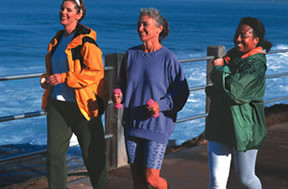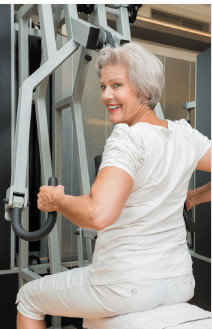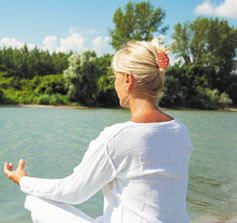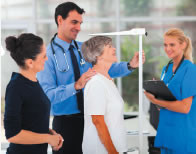
How does prostate cancer treatment affect mental health?

5 timeless habits for better health

What are the symptoms of prostate cancer?

Is your breakfast cereal healthy?

When pain signals an emergency: Symptoms you should never ignore

Does exercise give you energy?

Acupuncture for pain relief: How it works and what to expect

How to avoid jet lag: Tips for staying alert when you travel

Biofeedback therapy: How it works and how it can help relieve pain

Best vitamins and minerals for energy
Exercise & Fitness Archive
Articles
5 tips to make the Boston Marathon your marathon
On Marathon Monday, thousands of runners will start in Hopkinton, Mass., and finish in Copley Square. Some will glide along, some will lope, and others will shuffle. No matter how they run, or how fast they run, running the Boston Marathon is something special. Here are a few tips to make the Boston Marathon your marathon. 1) Never wear something on marathon day you haven’t worn for a distance run before. 2) If family or friends will be watching you along the route, try to know in advance where they will be. 3. “The wall” is real so have a plan. 4. Try to take in the atmosphere. 5. Enjoy the camaraderie.
Good balance requires mental and physical fitness
Balance can't be taken for granted past a certain age; it must be maintained — both in mind and body.
General physical fitness and targeted exercises to improve balance can prevent falls. But so can staying mentally active to maintain brain health. A sharp mind helps you to think — and stay — on your feet.
Regular exercise reduces falls and fractures
Your bone strength and size peaks by age 30. After that, bones tend to become less dense, making them more fragile and subject to breaks. Bone strength in later life depends upon your peak bone mass in youth. An active lifestyle in youth can increase maximum bone density.
Even if you're older, exercise is still a great way to protect your bones. The physical stress placed on bones during exercise stimulates the growth of new bone tissue. The type of exercise you do matters. To bolster your bones, you need to get regular weight-bearing exercise. This includes weight lifting and resistance training, as well as any type of activity that forces you to work against gravity by standing or carrying your body's weight, including running, walking, dancing, and stair climbing. Activities such as swimming or biking aren't weight-bearing and thus don't build bone. Generally, higher-impact activities (such as running) or resistance exercises (such as strength training) have a more pronounced effect on bone than lower-impact exercises, such as walking.
Benefits of flexibility exercises
Activities that lengthen and stretch muscles can help you prevent injuries, back pain, and balance problems.
A well-stretched muscle more easily achieves its full range of motion. This improves athletic performance — imagine an easier, less restricted golf swing or tennis serve — and functional abilities, such as reaching, bending, or stooping during daily tasks. Stretching can also be a great way to get you moving in the morning or a way to relax after a long day. Activities such as yoga combine stretching and relaxation and also improve balance, a wonderful combination.
Are you really getting enough exercise?
Resistance machines can provide safe, effective strength training. Image: Thinkstock |
To get the full benefit of your workout, you need to know how hard you're exercising, and that can be different for everyone.
Ask the doctor: I fractured my hip three years ago, but my leg still hurts when I exercise. Should I stop exercising?
Image: Thinkstock |
Q. I'm a 78-year-old athlete and dancer. Three years ago, I broke my hip. After it was repaired I completed extensive physical therapy. Since then, I've been working out at a gym using the treadmill, stationary bicycle, and rowing machine. But I still have tremendous pain in my thigh. Should I stop exercising? It helps me control my weight and blood pressure.
A. I applaud you for persisting with your exercise. You're not only keeping your weight and blood pressure down but you're also building stronger bones to help prevent fractures in the future.
6 ways to use your mind to control pain
Meditation with guided imagery, which often involves imagining yourself in a restful environment, may reduce your need for pain medication. |
Relaxation, meditation, positive thinking, and other mind-body techniques can help reduce your need for pain medication.
Drugs are very good at getting rid of pain, but they often have unpleasant, and even serious, side effects when used for a long time. If you have backache, fibromyalgia, arthritis, or other chronic pain that interferes with your daily life, you may be looking for a way to relieve discomfort that doesn't involve drugs. Some age-old techniques—including meditation and yoga—as well as newer variations may help reduce your need for pain medication.
Why do women fall?
It's well known that women fall more often than men, but why is that so? A team of Canadian researchers tackled that question by looking for factors that tend to put women at higher risk than men for spills.
The researchers studied around 15,000 adults ages 65 and older who were enrolled in the Canadian Community Health Survey–Healthy Aging. All the participants were asked if they had suffered a fall serious enough to limit their normal activity. People who answered "yes" were then queried about their lifestyles and medical histories. When the researchers analyzed the answers, they determined that stroke, arthritis, and poor nutrition increased the risk of falls in both men and women. However, different risk factors were linked to falls for women, including being 85 or older, having at least one alcoholic drink a week, taking five or more medications, and having diabetes or osteoporosis. The findings were reported online Feb. 19, 2015, by the American Journal of Epidemiology.
Ask the doctor: Why am I getting shorter?
After age 40, people lose about half an inch in height with each decade, mainly in the spine. Image: Thinkstock |
Q. Why do people over 60 lose height? I've lost a few inches over the years. Can this be prevented?
Don't just sit there
Stop sitting during TV commercial breaks. Jump up off the couch, and use the time to exercise. Image: Thinkstock |
Easy ways to increase activity and cut down on sedentary time.

How does prostate cancer treatment affect mental health?

5 timeless habits for better health

What are the symptoms of prostate cancer?

Is your breakfast cereal healthy?

When pain signals an emergency: Symptoms you should never ignore

Does exercise give you energy?

Acupuncture for pain relief: How it works and what to expect

How to avoid jet lag: Tips for staying alert when you travel

Biofeedback therapy: How it works and how it can help relieve pain

Best vitamins and minerals for energy
Free Healthbeat Signup
Get the latest in health news delivered to your inbox!
Sign Up









